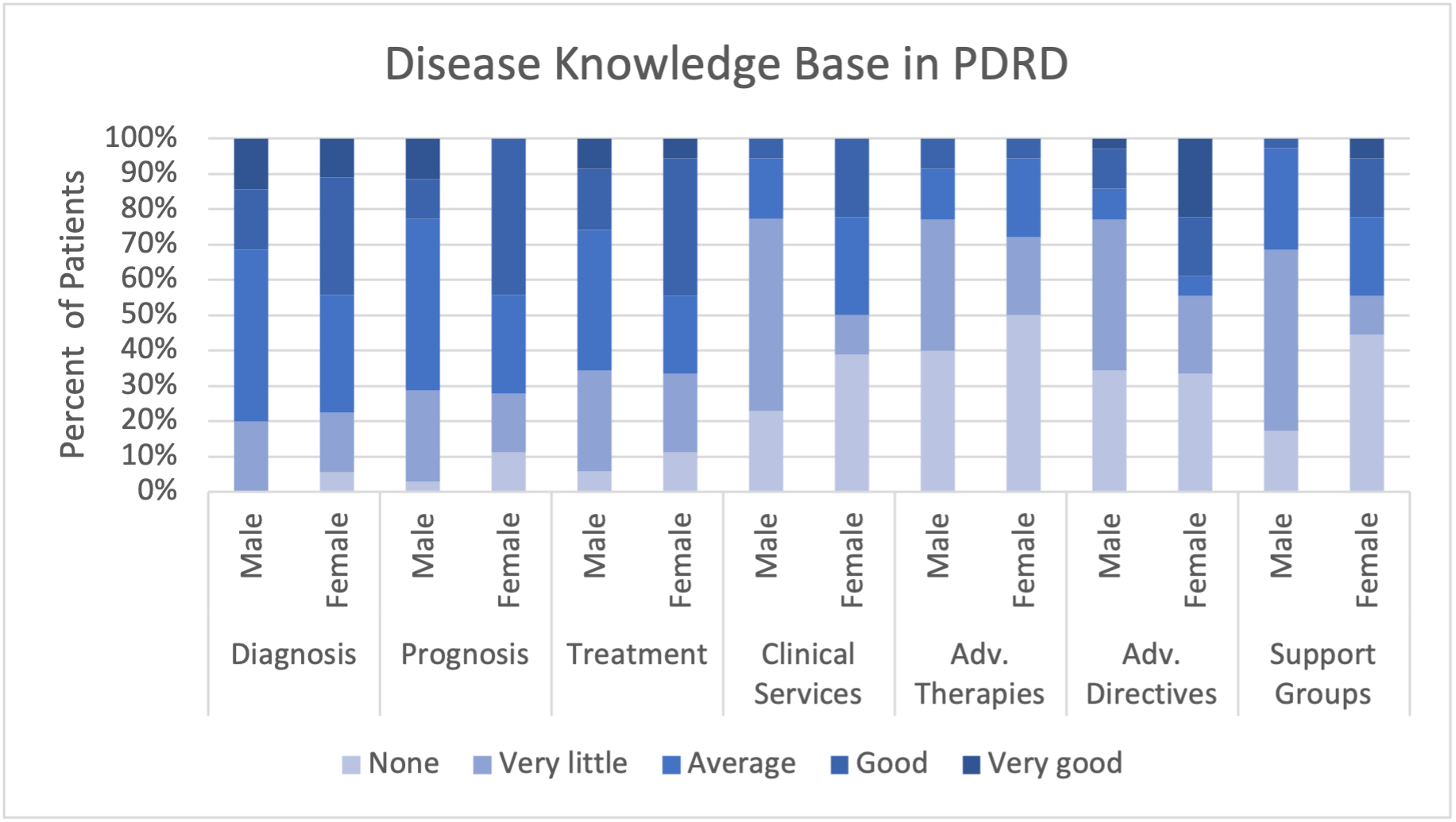Objective: To examine sex differences in the knowledge base of Parkinson’s Disease and Related Disorders (PDRD)
Background: Biologic sex accounts for differences in PDRD, not only incidence and prevalence, but females also have higher mortality and faster disease progression, differences in motor and nonmotor symptoms, as well as treatment response. [1] Females receive lower quality of healthcare than males and are less likely to access medical care, and be cared for by a neurologist or PDRD specialist. [2] A major goal of advanced care planning (ACP) is to improve quality of life (QoL), which begins with the patient’s knowledge of their disease, prognosis, and management. [3] This is important for clinicians to better tailor education towards males and females.
Method: This was a cross-sectional study of PDRD patients who attended our Supportive Care and Planning (SCP) Clinic between November 2020 and November 2021. Disease knowledge was measured using a five-point Likert scale across 7 measures: diagnosis, prognosis, treatments, clinic services, advanced therapies, advanced directives, and support groups and organizations.
Results: A total of 53 PDRD patients were seen in the SCP clinic over 1 year. The mean age was 74.4 ± 9.2 years, 66% males, mean H&Y of 2.3 ± 0.6, disease duration 6.3 ± 5.5 years. IPD was the most frequent diagnosis in 48/53 (90.6%) of patients. Knowledge regarding support groups, clinical services, and advanced directives was poor among both men and women, however, women tended to report higher knowledge as compared to men. Knowledge regarding advanced treatments was reported as poor for both males and females.
Conclusion: This exploratory study was done to examine knowledge among males vs females in various aspects of PDRD. Overall, disease knowledge was worse regarding clinical services, advanced therapies, and advanced directives as compared to diagnosis, prognosis, and treatments. One reason for this may be because neurologists spend more time discussing the latter at regular visits. This emphasizes the need for SCP visits to close that knowledge gap. Due to sample size, no specific inferences comparing knowledge base in males and females can be determined, however it would be important to build upon these prelim results including more specific questions in future analyses and interventions for patient education.
References: [1] Cerri S, Mus L, Blandini F. Parkinson’s disease in women and men: what’s the difference? J Parkinsons Dis. 9(3):501-515.
[2] Fullard ME, Thibault DP, Todaro V, et al. Sex disparities in health and health care utilization after parkinson diagnosis: rethinking pd associated disability. Parkinsonism Relat Disord. 2018;48:45-50.
[3] Rietjens JAC, Sudore RL, Connolly M, et al. Definition and recommendations for advance care planning: an international consensus supported by the European Association for Palliative Care. Lancet Oncol. 2017;18(9):e543-e551.
To cite this abstract in AMA style:
C. Selvadurai, E. Cournean, D. Costello, N. Prakash, B. Rodrigues. Disease knowledge in males and females with Parkinson’s Disease and Related Disorders [abstract]. Mov Disord. 2022; 37 (suppl 2). https://www.mdsabstracts.org/abstract/disease-knowledge-in-males-and-females-with-parkinsons-disease-and-related-disorders/. Accessed January 6, 2026.« Back to 2022 International Congress
MDS Abstracts - https://www.mdsabstracts.org/abstract/disease-knowledge-in-males-and-females-with-parkinsons-disease-and-related-disorders/

